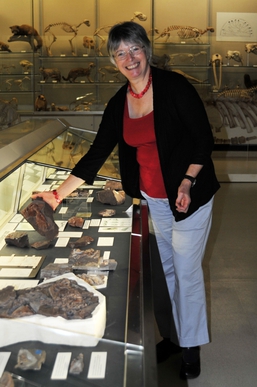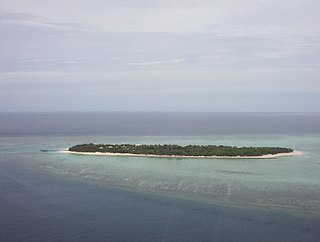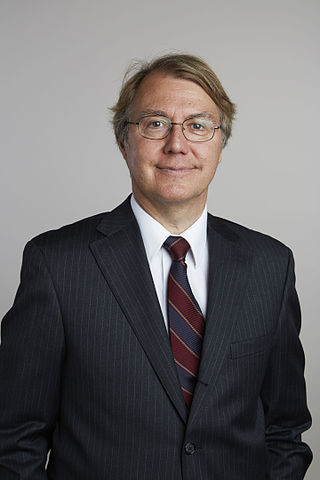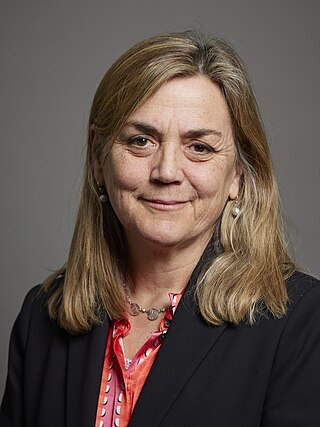Related Research Articles

Jennifer Alice Clack, was an English palaeontologist and evolutionary biologist. She specialised in the early evolution of tetrapods, specifically studying the "fish to tetrapod" transition: the origin, evolutionary development and radiation of early tetrapods and their relatives among the lobe-finned fishes. She is best known for her book Gaining Ground: the Origin and Early Evolution of Tetrapods, published in 2002 and written with the layperson in mind.

A cay, also spelled caye or key, is a small, low-elevation, sandy island on the surface of a coral reef. Cays occur in tropical environments throughout the Pacific, Atlantic, and Indian oceans, including in the Caribbean and on the Great Barrier Reef and Belize Barrier Reef.

Dorothy Hill, was an Australian geologist and palaeontologist, the first female professor at an Australian university, and the first female president of the Australian Academy of Science.
John Frederick Dewey is a British structural geologist and a strong proponent of the theory of plate tectonics, building upon the early work undertaken in the 1960s and 1970s. He is widely regarded as an authority on the development and evolution of mountain ranges.

Andrew Herbert Knoll is the Fisher Research Professor of Natural History and a Research Professor of Earth and Planetary Sciences at Harvard University. Born in West Reading, Pennsylvania, in 1951, Andrew Knoll graduated from Lehigh University with a Bachelor of Arts in 1973 and received his Ph.D. from Harvard University in 1977 for a dissertation titled "Studies in Archean and Early Proterozoic Paleontology." Knoll taught at Oberlin College for five years before returning to Harvard as a professor in 1982. At Harvard, he serves in the departments of Organismic and Evolutionary Biology and Earth and Planetary Sciences.

Tanya Atwater is an American geophysicist and marine geologist who specializes in plate tectonics. She is particularly renowned for her early research on the plate tectonic history of western North America.

Philip Conrad James Donoghue FRS is a British palaeontologist and Professor of Palaeobiology at the University of Bristol.
Professor Henry "Harry" Elderfield, was Professor of Ocean Chemistry and Palaeochemistry at the Godwin Laboratory in the Department of Earth Sciences at the University of Cambridge. He made his name in ocean chemistry and palaeochemistry, using trace metals and isotopes in biogenic carbonate as palaeochemical tracers, and studying the chemistry of modern and ancient oceans - especially those of the glacial epoch and the Cenozoic.

Sidnie Milana MantonFLS FRS was an influential British zoologist. She is known for making advances in the field of functional morphology. She is regarded as being one of the most outstanding zoologists of the twentieth century.
Bernard (Bernie) Wood is a British geologist, and professor of mineralogy and senior research fellow at the University of Oxford. He specializes in the thermodynamics of geological systems, using experimental techniques. He is a prominent figure in the field of experimental petrology, having received multiple awards throughout his career and taught at several universities worldwide.

Katherine Jane Willis, Baroness Willis of Summertown, is a British biologist, academic and life peer, who studies the relationship between long-term ecosystem dynamics and environmental change. She is Professor of Biodiversity in the Department of Biology and Pro-Vice-Chancellor at the University of Oxford, and an adjunct professor in biology at the University of Bergen. In 2018 she was elected Principal of St Edmund Hall, and took up the position from 1 October. She held the Tasso Leventis Chair of Biodiversity at Oxford and was founding Director, now Associate Director, of the Biodiversity Institute Oxford. Willis was Director of Science at the Royal Botanic Gardens, Kew from 2013 to 2018. Her nomination by the House of Lords Appointments Commission as a crossbench life peer was announced on 17 May 2022.

Frederick T. Mackenzie was an American sedimentary and global biogeochemist. Mackenzie applied experimental and field data coupled to a sound theoretical framework to the solution of geological, geochemical, and oceanographic problems at various time and space scales.

Dawn Yvonne Sumner is an American geologist, planetary scientist, and astrobiologist. She is a professor at the University of California, Davis. Sumner's research includes evaluating microbial communities in Antarctic lakes, exploration of Mars via the Curiosity rover, and characterization of microbial communities in the lab and from ancient geologic samples. She is an investigator on the NASA Mars Science Laboratory (MSL) and was Chair of the UC Davis Department of Earth & Planetary Sciences from 2014 to 2016. She is Fellow of the Geological Society of America.
Tanja Bosak is a Croatian-American experimental geobiologist who is currently an associate professor in the Earth, Atmosphere, and Planetary Science department at the Massachusetts Institute of Technology. Her awards include the Subaru Outstanding Woman in Science Award from the Geological Society of America (2007), the James B. Macelwane Medal from the American Geophysical Union (2011), and was elected an AGU fellow (2011). Bosak is recognized for her work understanding stromatolite genesis, in addition to her work in broader geobiology and geochemistry.

Pamela Hallock Muller is a scientist, oceanographer and professor at the University of South Florida in the College of Marine Science.

Susannah M. Porter is an American paleontologist and geobiologist who studies the early evolution of eukaryotes, the early Cambrian fossil record of animals, and the evolution of skeletal biomineralization. She is currently a professor at the University of California, Santa Barbara. Porter is a Fellow of the Paleontological Society. She has received national recognition awards from the Geological Society of America.
Judith Ann McKenzie was an American biogeochemist known for her research on past climate change, chemical cycles in sediments, and geobiology.
Joan Ann ("Joanie") Kleypas is a marine scientist known for her work on the impact of ocean acidification and climate change on coral reefs, and for advancing solutions to environmental problems caused by climate change.
Janice Bishop is a planetary scientist known for her research into the minerals found on Mars.

Irina M. Artemieva is Professor of Geophysics at the GEOMAR Helmholtz Centre for Ocean Research in Kiel (Germany), Distinguished Professor at the China University of Geosciences (Wuhan), and Distinguished Professor at SinoProbe at the Chinese Academy of Geological Sciences (Beijing).
References
- ↑ "Rachel Wood – Research – Personal research page".
- ↑ "Rachel Wood".
- ↑ Buddemeier, Robert W. (1999). "Geology and ecology of coral reefs". Nature. 302: 121. doi: 10.1038/45922 . S2CID 5298519.
- ↑ Veron, J. E. N. (2000). "PALEOBIOLOGY:Reef Processes in the Long View". Science. 287 (5454): 811–812. doi:10.1126/science.287.5454.811. S2CID 128929011.
- ↑ "Reef Evolution".
- ↑ "Rachel Wood – Research – Personal research page".
- ↑ "Rachel Wood". The Royal Society. Retrieved 2022-05-16.
- ↑ "Outstanding scientists elected as Fellows and Foreign Members of the Royal Society". The Royal Society. 2022-05-10. Retrieved 2022-05-16.